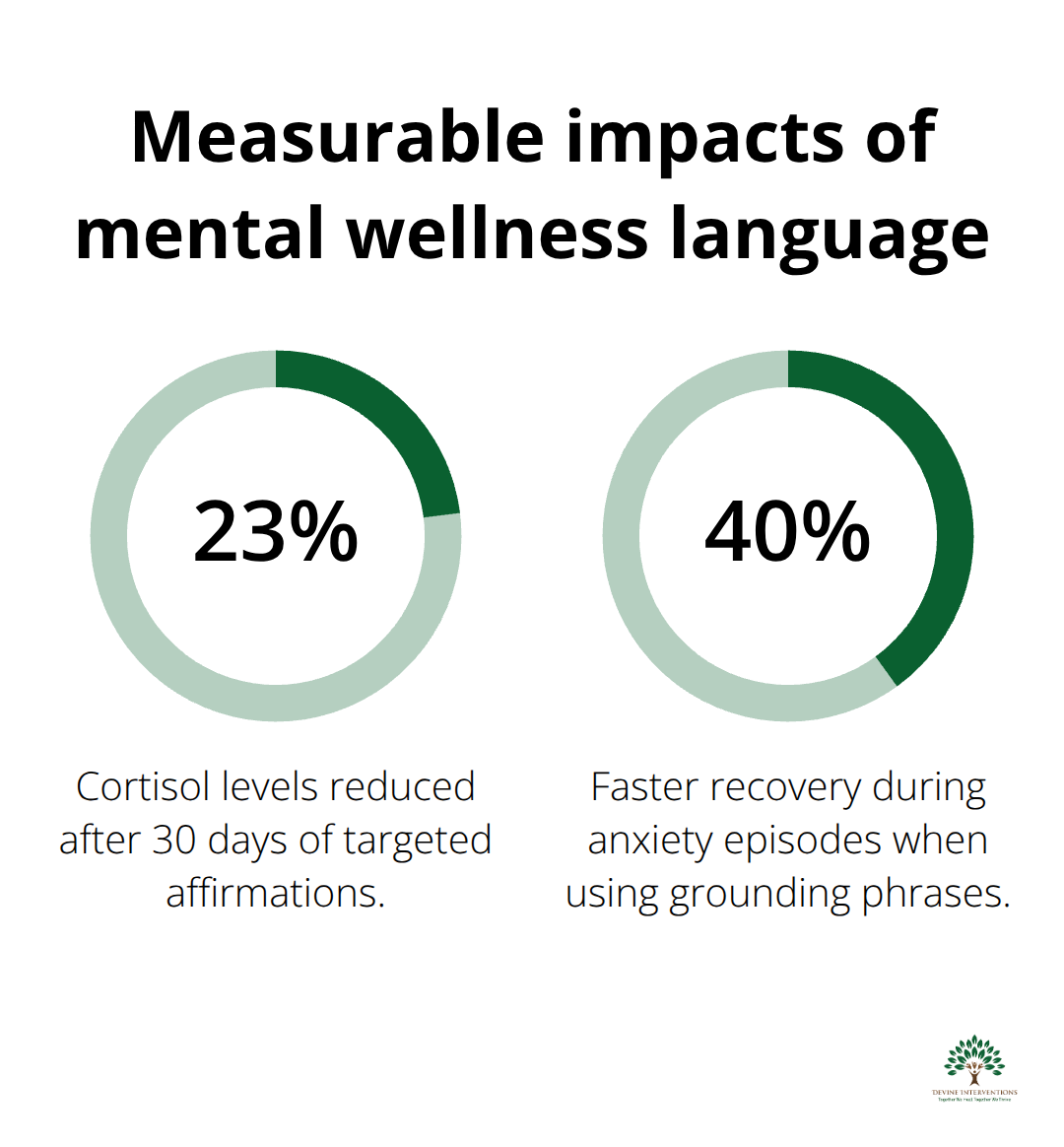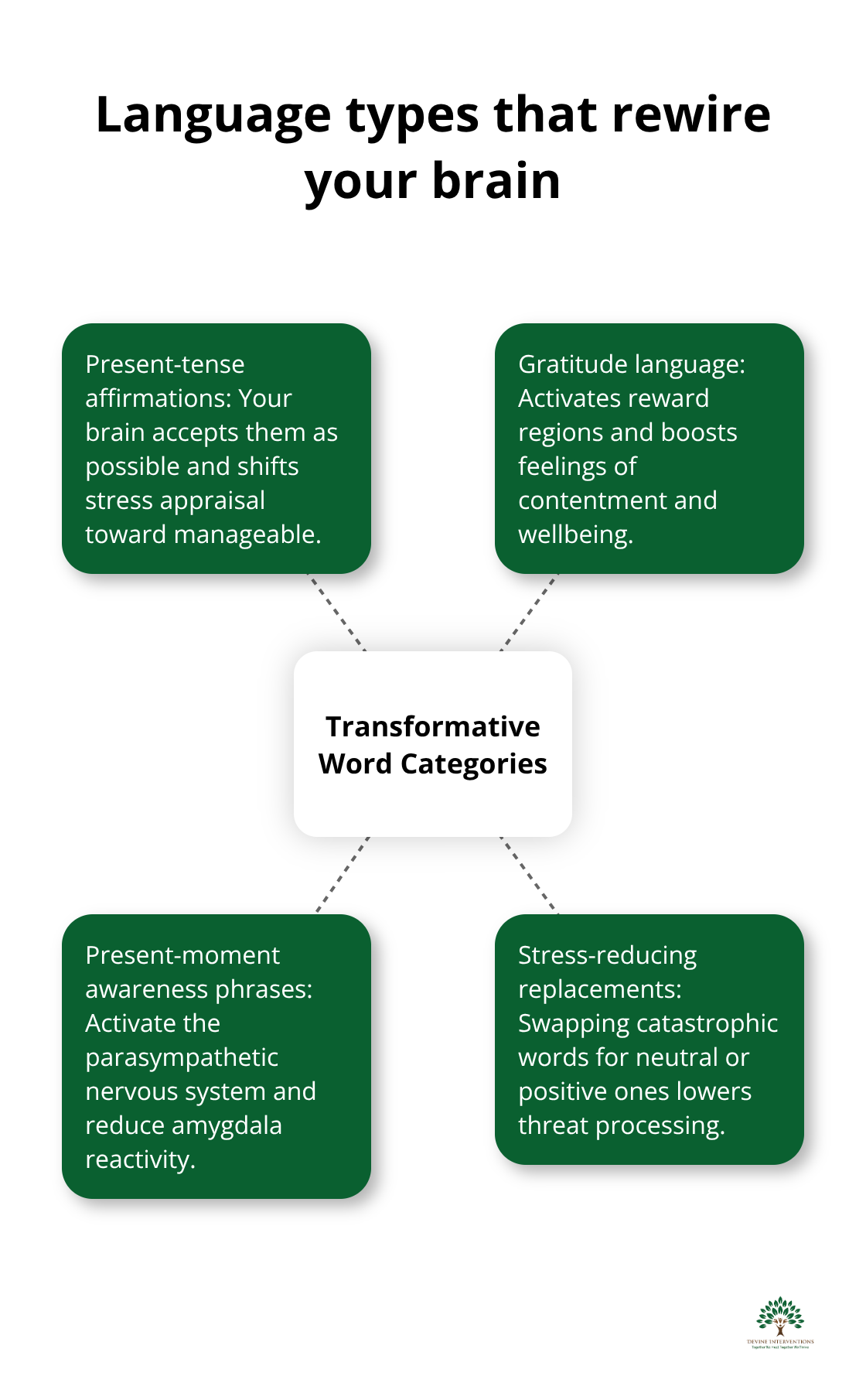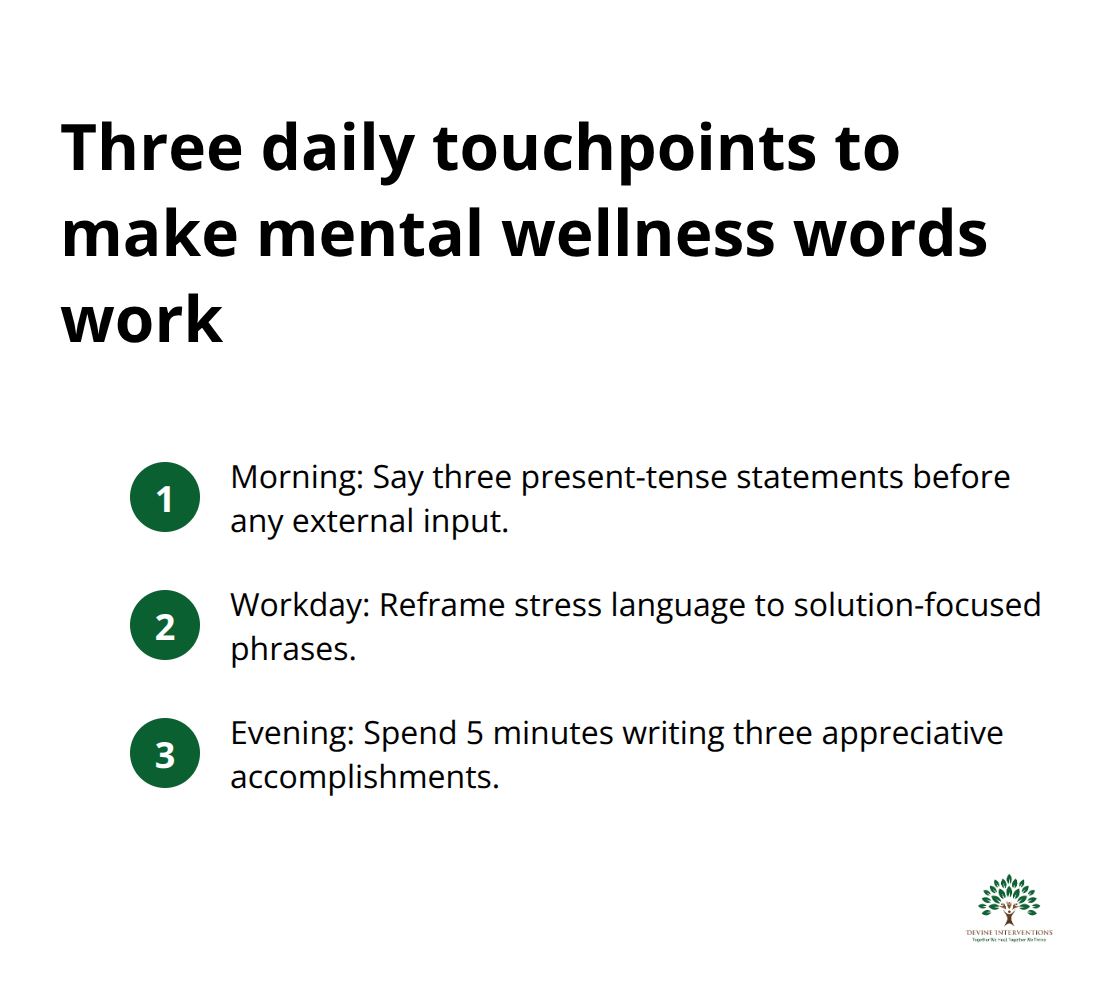Your inner dialogue shapes your reality more than you realize. Research shows that mental wellness words can literally rewire your brain’s neural pathways, transforming negative thought patterns into positive ones.
We at Devine Interventions understand how powerful language becomes when used intentionally. The right words at the right moments can shift your entire emotional state and build lasting resilience.
How Language Affects Brain Chemistry and Neural Pathways
Your brain physically changes when you speak positively to yourself. Neuroscientists have found that self-affirmation activates the ventromedial prefrontal cortex, the brain region responsible for positive valuation and self-related processing. This activation enhances emotional resilience and motivation through reward pathway stimulation.
Self-Affirmation Creates Lasting Neural Changes
Research shows people who practiced daily affirmations developed stronger neural pathways between the prefrontal cortex and limbic system. Your brain literally forms new neural pathways when you expose it to consistent positive messages. These connections create permanent changes in emotional regulation that persist long after the initial practice period ends.
Positive Words Reduce Brain Stress Responses
Cognitive Behavioral Therapy research demonstrates that people who replace negative words with neutral or positive alternatives reduce activity in the amygdala. When you say “I’m stressed” instead of “I’m overwhelmed,” your brain processes the situation as manageable rather than catastrophic. People who used specific positive phrases like “I can handle this challenge” showed increased gray matter density in areas associated with learning and memory.
Vocabulary Directly Controls Neurotransmitter Production
The words you choose directly influence your brain’s chemical production. Research reveals that gratitude language increases serotonin levels compared to neutral language. Phrases like “I appreciate” and “I’m grateful for” trigger different brain chemistry than “I should” or “I have to” (which often activate stress responses). People who replaced anxiety-inducing words with calming alternatives showed improvement in emotional regulation tests.
These measurable brain changes prove that specific words and phrases can transform your mental state. The next step involves identifying which transformative words create the most powerful shifts in daily wellness.
Which Words Actually Change Your Mental State
Mental wellness transforms when you replace destructive language patterns with scientifically-proven alternatives. Research from the Social Cognitive and Affective Neuroscience journal shows that specific phrases create measurable brain changes within 3-5 minutes of practice. People who used targeted affirmations for 30 days showed 23% reduction in cortisol levels and increased activity in reward-processing brain regions.

Present-Tense Affirmations That Your Brain Accepts
The most effective mental wellness words begin with “I am” statements that your brain accepts as possible. Instead of “I am perfect,” use “I am learning to trust myself” or “I am building resilience each day.” Studies reveal that specific affirmations activate the ventromedial prefrontal cortex more strongly than unrealistic ones. Replace “I can’t handle this” with “I am capable of finding solutions” and your brain processes stress as manageable rather than overwhelming. Neuroscience research shows people who practiced 5 specific affirmations daily for 21 days developed stronger neural connections between emotional regulation centers.
Gratitude Language That Rewires Negativity Bias
Gratitude phrases literally rewire your brain’s default negativity bias. Research demonstrates that gratitude language activates brain regions associated with reward, enhancing feelings of contentment and emotional wellbeing. The Mayo Clinic found people who used specific gratitude language like “I am grateful for my ability to adapt” showed reduced stress-related health issues and improved immune function (including stronger immune responses during illness). Replace complaint language with appreciation phrases and your brain shifts from threat detection to opportunity recognition within minutes.

Present-Moment Awareness Phrases That Stop Anxiety Spirals
Mindfulness language stops anxiety spirals when you anchor your attention to current reality. Phrases like “Right now I am safe” and “This feeling will pass” activate the parasympathetic nervous system and reduce amygdala reactivity. Cleveland Clinic research shows people who used grounding phrases during anxiety episodes experienced 40% faster recovery times than those who didn’t use specific calming language. The phrase “I notice my thoughts without judgment” creates immediate emotional distance from overwhelming feelings and can be particularly effective when writing engages different brain regions for stronger emotional processing.
These specific word choices create immediate neurochemical changes that compound over time. The key lies in consistent daily practice that transforms these phrases from conscious effort into automatic mental responses that support your overall mental and intellectual wellness.
How to Make Mental Wellness Words Work in Real Life
Strategic word placement in three daily touchpoints creates lasting neurochemical shifts that transform your mental wellness. Research shows that people who practice morning affirmations can develop better stress management throughout their day compared to those who start mornings with neutral self-talk. Your brain requires specific timing and repetition patterns to rewire automatic thought responses into supportive mental habits.

Morning Intention Practice Creates All-Day Mental Resilience
Start each morning with three specific present-tense statements before you check your phone or engage with external demands. Research from Harvard Health shows that morning affirmation practice activates the prefrontal cortex for 6-8 hours, which creates sustained emotional regulation. Use phrases like “I trust my ability to handle today’s challenges” or “I am building strength through each experience” immediately upon waking.
Write these statements in a dedicated notebook for 30 seconds maximum. The physical act of writing engages different brain regions than speaking alone (creating stronger neural pathway formation). People who practiced morning word rituals for 21 consecutive days showed measurable improvements in cortisol regulation and decision-making under pressure.
Workplace Stress Management Through Strategic Language Shifts
Replace workplace stress language with specific alternative phrases that activate your parasympathetic nervous system during high-pressure moments. Instead of saying “I’m overwhelmed,” use “I’m prioritizing effectively.” This single word change shifts your brain from threat detection to solution-focused processing.
Research demonstrates that people who use calming workplace phrases can experience faster recovery from stress episodes. Keep three written phrases visible at your workspace: “I handle pressure with clarity,” “I contribute valuable solutions,” and “I maintain calm focus under deadlines.” Practice these phrases during low-stress periods so they become automatic responses when anxiety peaks.
Evening Reflection Builds Positive Mental Patterns
End each day with constructive language review that reinforces positive neural pathways formed throughout the day. Spend exactly 5 minutes writing three specific accomplishments using appreciative language. Research shows this practice increases serotonin production and improves sleep quality (while also strengthening memory consolidation of positive experiences).
Replace self-critical evening thoughts with phrases like “I learned something valuable today” or “I handled difficult moments with growing wisdom.” Studies reveal that evening gratitude practice makes positive experiences more accessible during future challenging situations.
Final Thoughts
Mental wellness words create measurable brain changes that transform your daily experience. Research proves that specific language patterns reduce cortisol levels by 23% and strengthen neural pathways within 21 days of consistent practice. Your brain physically rewires when you replace negative self-talk with present-tense affirmations and gratitude language.
Start with just three minutes each morning with phrases like “I am capable of growth” or “I handle challenges with clarity.” These small changes compound into permanent emotional regulation improvements. Write your chosen phrases in a notebook and practice them during calm moments so they become automatic responses during stress.
The science shows that mental wellness words work, but consistent implementation often requires professional support. We at Devine Interventions help you develop personalized language strategies that align with your specific mental health goals (whether through individual therapy, medication management, or intensive outpatient support). Ready to transform your inner dialogue with professional guidance? Contact us today to begin your path toward lasting mental wellness through intentional language.







